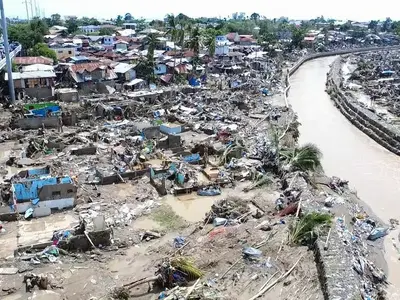
Courtesy: Greenpeace Philippines
Beyond the Headlines: LGUs Struggle to Deliver Aid After Typhoon Tino”
Cebu City, Philippines – While President Marcos has declared a state of national calamity and promised aid in the wake of Typhoon Tino, local government units (LGUs) are facing immense challenges in delivering assistance to their constituents. The sheer scale of the devastation, coupled with logistical nightmares and communication breakdowns, is hampering relief efforts across the Visayas region.
“The declaration of a national calamity is a welcome step, but it’s only the beginning,” said Mayor Maria Santos of Liloan, Cebu, one of the hardest-hit towns. “We appreciate the promised funds, but getting the aid to the people who need it most is proving to be incredibly difficult.”
Liloan, where AFP reporters witnessed cars piled atop each other and widespread destruction, is grappling with a complete breakdown of infrastructure. Roads are impassable, communication lines are down, and power outages persist, hindering the LGU’s ability to assess the full extent of the damage and coordinate relief efforts.
“We’re relying on word-of-mouth and volunteers to reach isolated communities,” Mayor Santos explained. “Our emergency vehicles are struggling to navigate the debris-filled roads, and we’re facing a shortage of manpower and resources.”
Similar challenges are being reported across the affected regions. In Negros Occidental, where 62 people are still missing, Governor Benitez highlighted the difficulty of conducting search and rescue operations due to the lack of equipment and trained personnel.
“We’re doing everything we can with what we have, but we’re stretched thin,” Governor Benitez said in a press conference. “We need more support from the national government in terms of equipment, manpower, and logistical assistance.”
The Department of Energy (DOE) reported that approximately 1.4 million household power connections in the Visayas remain without electricity, impacting an estimated seven million residents. This prolonged power outage is not only causing discomfort but also hampering the operations of hospitals, water treatment plants, and other essential services.
“The lack of electricity is a major obstacle to our relief efforts,” said Dr. Cruz, head of a local hospital in Cebu City. “We’re relying on generators, but they’re not enough to meet the demand. We need power restored as soon as possible.”
While the Office of the President has pledged P760 million in cash assistance to affected LGUs, officials are concerned about the bureaucratic hurdles and delays in accessing these funds.
“We hope the funds will be released quickly and efficiently,” said Mayor Santos. “Every day counts when people are struggling to survive.”
As the cleanup and recovery efforts continue, the focus is now on ensuring that aid reaches those who need it most. The challenges faced by LGUs highlight the need for better disaster preparedness, improved coordination between national and local governments, and a more efficient system for delivering assistance in times of crisis.



